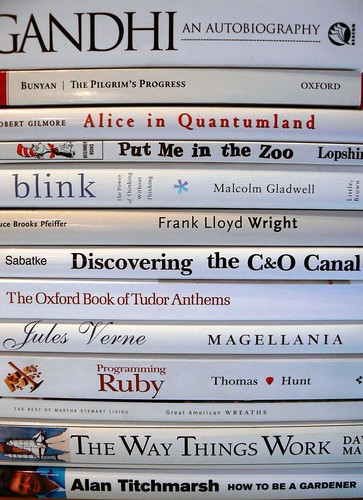Photo thanks to Vicki
It has been my observation that in academic writing, titles (when a student remembers to include one at all) tend to be afterthoughts, a handful of words haphazardly thrown together and slapped on the page as a finishing touch. These poor, abused headings receive the least amount of effort in their creation by a writer when, in fact, they receive the most amount of attention from a would-be reader.
We've all been told not to judge a book by its cover, but usually when you walk into a bookstore with rows upon rows of shelves lined with books, scanning book covers for a title that catches your interest is all you have time to do.
I have seen well written titles turn a paper on a topic I have absolutely no interest in reading into a paper that I can't wait to get my hands on. One excellent example is a research paper I received on the benefits of improving the prison education system. What made this paper stand out was its title:
That's not to say that having an amazing title is all it takes. An attention grabbing title will put your work in someone's hands, but whether or not s/he actually reads it depends on the quality of the writing itself.
Remember that the next time you're putting together a project for work, creating proposals, or writing an e-mail. Putting a little bit of thought into writing the perfect title will go a long way towards how receptive your audience is to your message.
It has been my observation that in academic writing, titles (when a student remembers to include one at all) tend to be afterthoughts, a handful of words haphazardly thrown together and slapped on the page as a finishing touch. These poor, abused headings receive the least amount of effort in their creation by a writer when, in fact, they receive the most amount of attention from a would-be reader.
Titles are the single most important determiners of whether your writing will be read.
We've all been told not to judge a book by its cover, but usually when you walk into a bookstore with rows upon rows of shelves lined with books, scanning book covers for a title that catches your interest is all you have time to do.
I have seen well written titles turn a paper on a topic I have absolutely no interest in reading into a paper that I can't wait to get my hands on. One excellent example is a research paper I received on the benefits of improving the prison education system. What made this paper stand out was its title:
The Pros of Educating ConsQuite frankly, I'm not all that interested in how good or bad our prisons' education system is. That title, however, not only piqued my interest in the topic, it also made me want to read more from a writer who had the creativity to come up with such a catchy headline (regardless of the topic!).
That's not to say that having an amazing title is all it takes. An attention grabbing title will put your work in someone's hands, but whether or not s/he actually reads it depends on the quality of the writing itself.
Remember that the next time you're putting together a project for work, creating proposals, or writing an e-mail. Putting a little bit of thought into writing the perfect title will go a long way towards how receptive your audience is to your message.



















